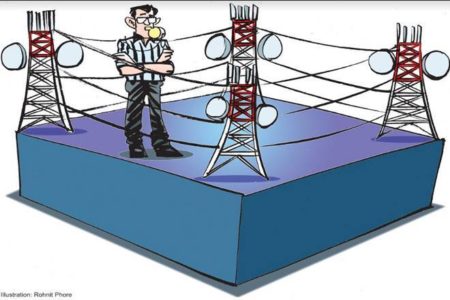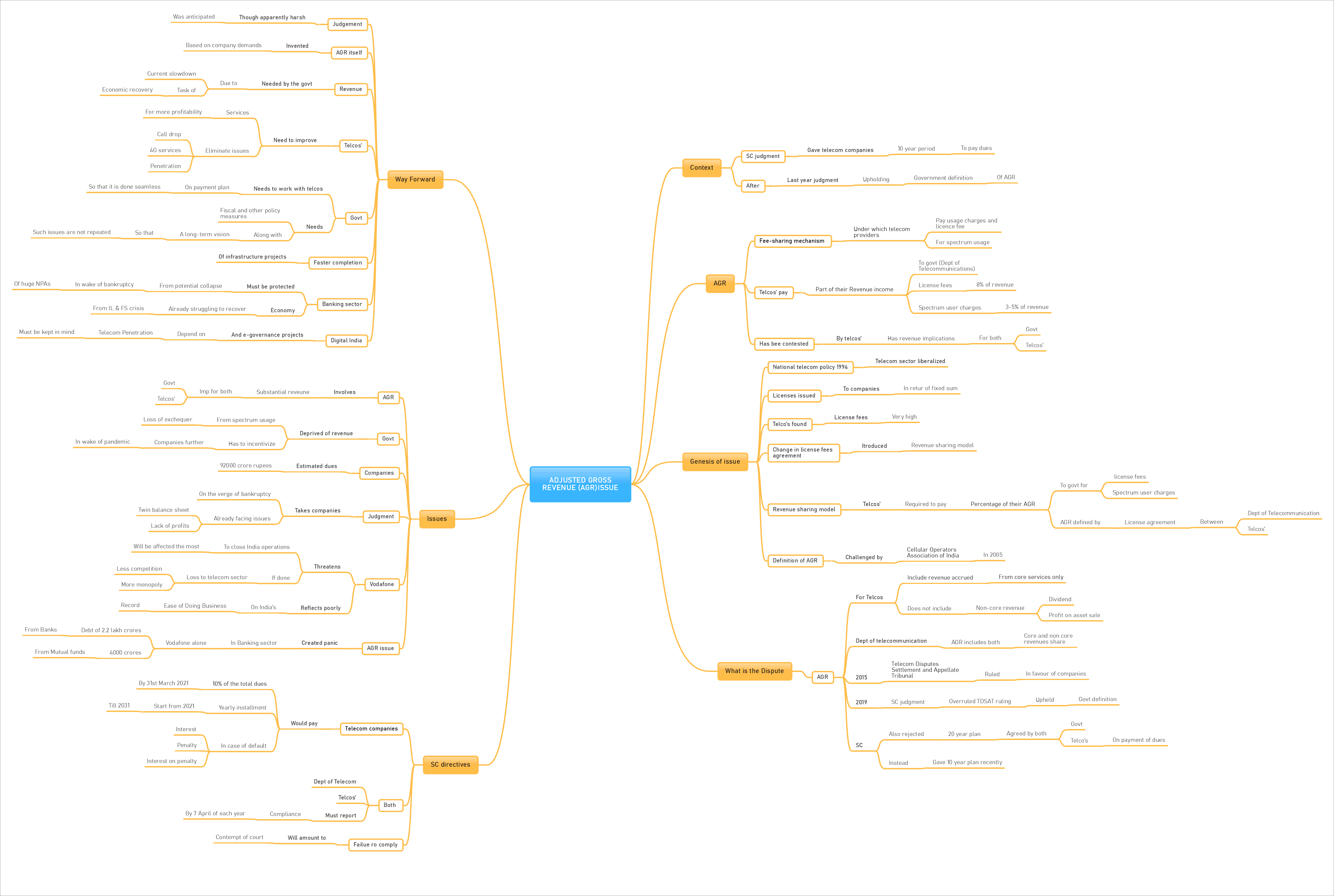Adjusted Gross Revenue Issue and its effect on Economy

From Current Affairs Notes for UPSC » Editorials & In-depths » This topic
IAS EXPRESS Vs UPSC Prelims 2024: 85+ questions reflected
Recently, the Supreme Court in the case of Adjusted Gross Revenues allowed the telecom companies 10 years’ time to pay the AGR dues to the department of telecommunications. The decision comes after the last years’ judgment which upheld the government definition of AGR calculations. The judgment is important with respect to its detailed and strict plan and its possible impact on the telecom and Banking sector and overall Indian Economy.
What is Adjusted Gross Revenue?
- Adjusted Gross Revenue (AGR) means a fee-sharing mechanism under which telecom providers pay a usage fee to the Department of telecommunications under the revenue sharing model.
- Telecom service provides pay some part of their Revenue income to the government as license fee (8% of the revenue) and spectrum usage charge (between 3 and 5%).
- The definition of AGR has been contested by the telecom companies and was because it has revenue implications for both government and the telecom companies.
Genesis of the issue
- The telecom sector was liberalized in 1994 under the National Telecom Policy after the Indian economy opened up to various sectors and investments.
- The telecom licenses were issued to companies in return for fixed license fees.
- The license fees were very high due to which Telco’s demanded reform in license fees. The government in 1999 introduced a revenue-sharing model instead of fixed license fees.
- Under this revenue-sharing model, telecom operators were required to pay a percentage of their AGR to the government for license fee and spectrum usage.
- The AGR is defined by the license agreements between the Department of Telecommunication and the telecom companies.
- This definition was challenged in 2005 by the Cellular Operators Association of India.
What is the dispute over AGR definition?
- The Telecom companies claimed that AGR should include revenue accrued from core services only and should not include dividend, profit on the sale of any investment or fixed asset.
- But the government argued that AGR includes all revenues from both core and non-core income.
- In 2015, the Telecom Disputes Settlement and Appellate Tribunal ruled in the favor of telecom companies and held that AGR includes all receipts except non-core income.
- The case went to Supreme Court further and SC upheld the DoT version of AGR definition in October 2019.
- The Court also rejected a 20-year payment timeline proposed by the central government which was supported by the telecom companies. It instead gave a 10 years’ timeline to repay the AGR dues.
What are the directions issued by the SC?
- The SC directed that the telecom companies would pay 10% of the total dues by 31st March 2021.
- The yearly installments will start from 2021 till 2031. The installments shall be paid by 31st March each year.
- If telecom companies default on payments of annual installments, interest as per the agreement will be levied. It will be along with penalty and interest o penalty too.
- Besides that, failure to pay installment would be punishable for contempt of court.
- The compliance report will be submitted by the telecom companies and the department of telecom every year on 7th April.
What are the issues involved in the SC ruling?
- The definition of AGR is a longstanding issue between the government as it involves a substantial amount of revenue.
- The Government has been deprived of the extra revenue due to litigation, it has to incentivize companies further in the wake of slowdown due to pandemic pressures.
- After the judgment, it was estimated that the telecom operators will owe the government to the tune of 92000 crore in total.
- This judgment has taken telecom companies on the verge of bankruptcy which are already facing losses due to already existing twin balance sheet issues, lack of profits due to the scale of Jio Launch.
- Vodafone has already threatened to close its India operations in the light of SC judgment as it is the company that will be affected the most.
- It reflects poorly on India’s ease of doing business as it makes it hard for companies to work in India.
- If Vodafone will shut its operations, it will render the telecom sector without much competition and it will lead to monopolization in the telecom sector.
- The AGR issue also has triggered panic in the Banking sector given that the telecom industry is highly leveraged. Vodafone India alone has a debt of 2.2 lakh crores from banks and 4000 crore from the mutual funds industry.
What should be the way forward?
- The SC judgment though apparently harsh on the telecom companies, was one of the possible outcomes.
- The AGR was invented because telecom companies demanded to remove earlier license fees.
- Spectrum allocation and its revenue is one of the important sources of government revenue. So, the government needs that revenue, more so in the current situation.
- What telecom companies need to do is to improve its services, eliminate issues such as call drops, better its 4G services so that they become profitable.
- The government must fast-track infrastructure development so that the service provided by the troubled players increases. For that to happen, a new infrastructure policy is needed.
- The government should work on providing necessary help to the telecom operators so that payment of the dues becomes easy. A long-term vision plan and improved coordination between government departments and companies so that such issues don’t arise is essential.
- The Banking sector must be protected against any defaulters on such huge debts as the country is still recovering from the IL & FS crisis.
- The digital India mission and e-governance projects depend on better telecom services. If the telecom companies are not supported through better fiscal and other policy measures, it will be difficult to achieve the mission targets.
Conclusion
The Ease of Doing Business Index has been showing that India is consistently doing well to achieve a good business environment through various reform measures. The case of AGR will be a step backward if the companies go bankrupt and India’s image as a potential business destination post-COVID will suffer. The government must find a middle ground between the SC judgment and issues of the telecom companies.
Practice Question for Mains
COVID-19 and legacy issues of prior unresolved issues could potentially damage India’s Ease of Doing Business record and put a break to its economic recovery. Discuss in the light of recent AGR judgment by the Supreme Court. (250 words)
If you like this post, please share your feedback in the comments section below so that we will upload more posts like this.


